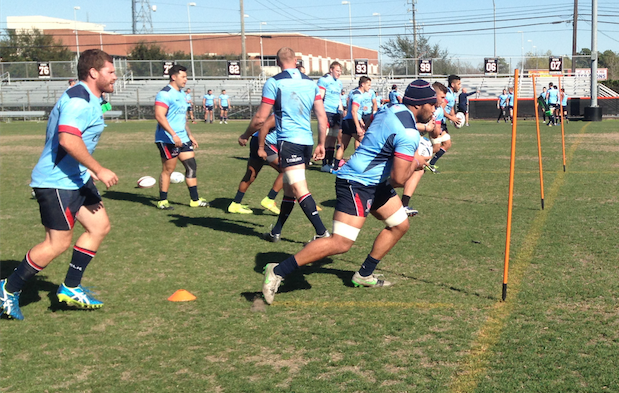
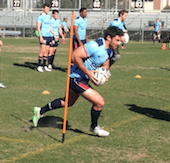
PHILADELPHIA, PA – The John Mitchell era has begun for the USA Eagles. In order to get some sense of what the next 4 years might bring for the Eagles, we need to know what Mitchell is setting out to do and how he hopes to do it. With that in mind, I went to Houston, observed some training before the match with Argentina and talked with Mitchell and several of the players. First, an observation about the position in which Mitchell finds himself.
The Mitchell era has begun, but the first weeks are also very much the product of Alex Magleby’s influence. Because of how late he was hired, Mitchell went into the first assembly with little knowledge of the players or the coaches. Mitchell did not have enough time to get to know the players the he might select for the ARC assembly. The fact that Magleby, Director of Performance, and Dave Williams, High Performance Strength and Conditioning Manager, were the key people making selection decisions makes sense.
However, I was surprised to learn that Magleby was also behind the selection of the coaching staff. When asked about the selection of the coaching staff, Mitchell had this to say: “Alex needs to take a lot of the credit for the structure and the competency that is here because I said, ‘What are the best 4 coaches in these areas in the country?’ Bascially he needs to take the credit for that. What I’ve seen so far, in early days, is that the competency and work ethic of these guys, and their teaching detail is very good.”
The inclusion of Mike Sosene-Feagai seemed like it might be the influence of Mitchell, but when asked if he knew Sosene-Feagai from New Zealand, Mitchell replied, “No. I actually know no one [in camp] really.”
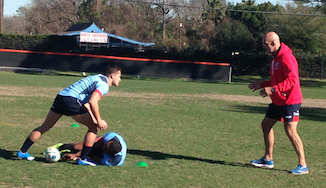
Without wanting to ignore the importance of the head coach, the first week of his involvement with the squad, for reasons beyond his control, was driven by other people. First, Magelby; second, the new coaches; and third, the veterans. For someone looking to build an environment of shared leadership, as Mitchell says he is, that shared control is not necessarily a bad thing.
“ARC for me is very much a foundation period and it’s a bedding in period. 2016’s going to be very much a foundation period. Clearly we’ll go into every match with the objective to win, but performance will be more important to me [than outcome] in the first year”
For someone who walked into a camp in which so many things were beyond his control, Mitchell seemed quite calm and relaxed about the situation. He does not seem to be in a rush. His goals are to qualify for the 2019 World Cup in Japan and to “bridge the gap” with the Tier 1 nations. Those are good goals, the right goals. For the veterans who went 0-4 at the World Cup, there are some more immediate goals.
It is pretty easy to see what needs to happen in order to achieve Mitchell’s goals – build depth in the player pool and raise the skill of all players – so the more interesting thing is trying to see how Mitchell is going to try to accomplish this. Since asking about the specifics of training isn’t likely to get an interesting answer, for all sorts of reasons, the question is phrased in terms of culture. When I spoke with Mitchell, I asked about culture (and environment); when Brian Vizard spoke with Mitchell before the match, he asked about culture; at the press conference immediately following the match, someone asked about culture. I’m not sure what we mean when we use that word, but we are curious about whatever it will mean to Mitchell and convinced that it is an important word.
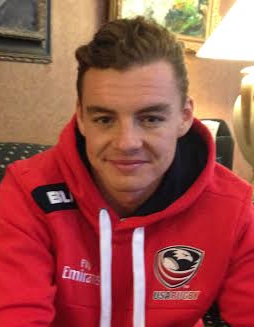
It seems like the culture he is trying to create is one in which individuals are given specific information on how to improve and then watched to see how well they can turn that information into improved performance. When answering my question, Mitchell acknowledged that more time is spent away from camp than in it. The goal is to “Improve individual performance but stay connected. Obviously there are some behaviors that we see as critical disciplines to us performing as a team, so we need to keep an eye on them, as well, when the players go back to their teams domestically and overseas.”
The first part of creating this culture is clearly communicating expectations to players. Tom Bliss, formerly of Wasps Academy, has “been very, very impressed. Obviously, [the] new coaches, they’ve set out what they want, what they expect of us as players. Compared to previous set-ups, it is very clear and obvious what they want from us.” Jake Anderson added that it “seems like the majority of the squad is definitely learning.”
When Blaine Scully talked about the week, he emphasized the communication aspect. “It’s been a really good opportunity to build relationships which I think will be very much a part of this team moving forward – both relationships with the players and staff and amongst the players and maintaining that connectivity which has always been tough for us in the past. You spend more time out of camp then you are in it. So hopefully that [connection] is something we can change.” If the young players are emphasizing the teaching work of the coaching staff, and the veterans are emphasizing communication and relationships, that suggests Mitchell is off to a good start in creating the environment he wants.
The long-term execution and improvement will be much more difficult than making a good first impression.
Mitchell also spoke of playing behaviors that he wanted to outlaw, “Some attacking, some defensive outlaws. Things like, we’ll keep on eye on their penalties given away and what type of penalties they are. In attack it will come down to making sure that a couple things in their breakdown work – and when they go to the advantage line – that they remain consistent whether they are in Eagles camp or in their clubs.” Hearing that, I asked if he thought he would really be able to get the kind of information from clubs he is looking for. “It is probably more me creating relationships with the directors of rugby and the coaches and giving the players the kind of things we will be looking at when they depart.”
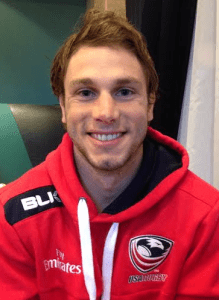
If Mitchell is able to get match data, like penalties conceded and what kind, for all of those in the player pool, and timely video for all players so that he and his staff can track details like breakdown work, he will be ahead of the previous coach, Mike Tolkin. In an email exchange last June, I asked Tolkin about tracking players’ form from a distance and he shared that getting quality information and/or game film was far from easy. I asked specifically about 9 players who were under consideration for the World Cup squad. For those, Tolkin wrote that they received game film consistently from “about half.” I very much look forward to hearing an update on this next winter. If he is successful, it was also mean that coaches in America are improving their systems.
In terms of relationships with professional clubs, Scully dismissed the idea that Mitchell might have an easier time getting players released, or even just getting information about players, than Tolkin. “I don’t think it has to do with the coach so much as it has to do with the situation.”
For his part, Mitchell said, “You kind of have empathy for the situation because the ARC [Americas Rugby Championship] was not in the plans when they invested in our USA players. I have empathy for that, but we’ve now got this opportunity. It is more about understanding and having an empathy for their situation and their having empathy for our situation. I’m not asking for 5 test matches, but can I get one or two. And then I can develop the depth in the remaining test matches.”
I was also curious as the whether Mitchell would wait to assess the players available and then develop a gameplan/style of play, or whether he would come in with an idea of what he wanted to do and then find the players to do that. “We have a style of football and framework in attack and defense that we’re taking the players to.” In other words, there are things we want to do, and we need to help the players improve so we can do them. When asked about whether he was satisfied that the players currently available had the skills to execute as he wants, he said, “I’m okay with the potential.”
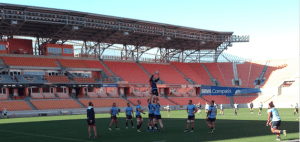 He identified the broad areas of ball-handling skills and decision-making as two areas that will need to improve in order for the full structure to work. If the players understand how they fit into the system and what they need to be able to do to make the system work, Mitchell believes, they will naturally start doing things like extra passing work on their own.
He identified the broad areas of ball-handling skills and decision-making as two areas that will need to improve in order for the full structure to work. If the players understand how they fit into the system and what they need to be able to do to make the system work, Mitchell believes, they will naturally start doing things like extra passing work on their own.
For those so inclined, there is always a reason to be optimistic. However, even for the pessimistically-inclined, there are reasons to see Mitchell’s chances of success as better than Mike Tolkin’s. Quite a few of those reasons have nothing at all to do with Mitchell himself.
Things working in Mitchell’s favor:
- More tests: With the addition of the ARC, the Eagles are going to be getting close to 12 tests a year. That is expected to include home matches against Ireland and New Zealand in the next few years. That will mean more time for the squad to be together, more chances to build squad depth, and potentially more financial resources for the team.
- Mike Friday: Friday is giving a template for how to succeed as a coach in America. The more successful the 7s program is, the easier it is to imagine the 15s team having success. America can beat New Zealand? Yes. Not everything connected to the success of the men’s 7s program is done to Friday, but he is now a figurehead for success for USA Rugby.
- The community: Before kick-off against Argentina in Houston, there was a video put up on the big screen of local youth rugby programs saying, “Go Eagles!” The entire rugby community in America is stronger than it was 4 years ago. Not only are there plenty of kids around to shout, “Go Eagles!”, but also more community-based individuals getting better at taking care of details off the pitch.
- PRO Rugby: If PRO Rugby is successful…Ooooh, Daisy! Player development, coach development, the chance for rugby fans in America to fully become American rugby fans – there is so much that might happen. Already, though, some of the players in the current squad are looking at the ARC and PRO Rugby as one season this spring for them. With more tests and a professional league, we will see American-based players whose year-round job is rugby.
The expectations for the Eagles for the next 4 years should be higher than they were in 2012. The Mitchell Era, with all that is happening around the new coach and with what John Mitchell himself is doing, is off to a good start.
Feel free to comment below, look for and “Like” our Facebook Rugby Wrap Up Page and follow us on Twitter@: RugbyWrapUp, Junoir Blaber,James Harrington, Jamie Wall, Nick Hall, DJ Eberle, Jake Frechette, Scheenagh Harrington, Jamie Loyd, Cody Kuxmann, Karen Ritter, Ronan Nelson, Kaitlin McCabe, Kyle Phillips, Rocky Brown and Declan Yeats, respectively.
[os-widget path=”/rugbywrapup/weekly-rugby-quiz”]

